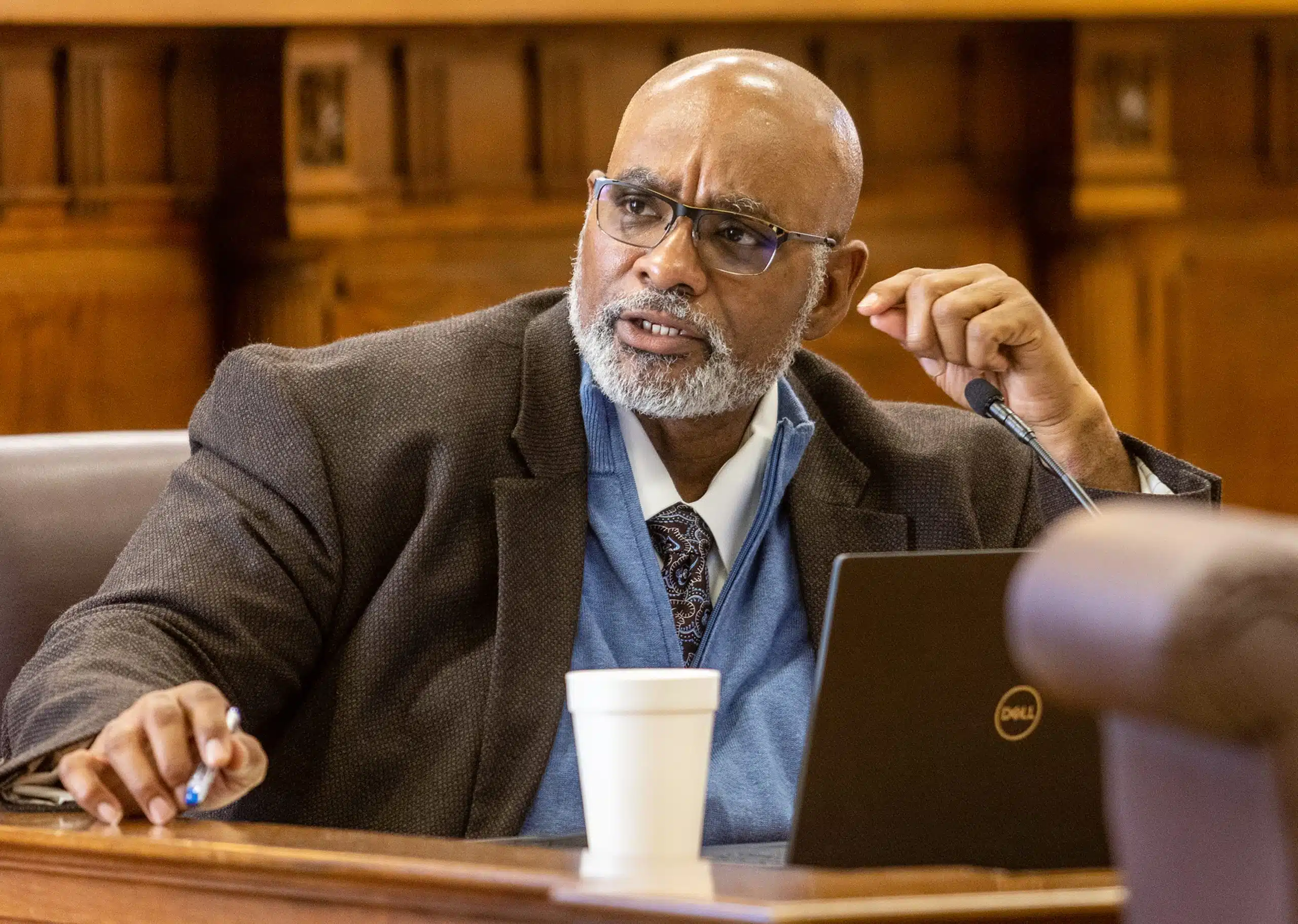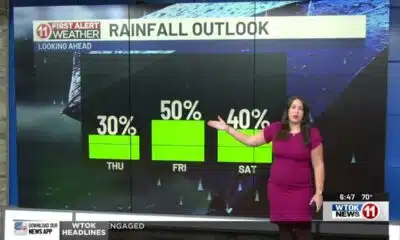Mississippi Today
Proposal to create Delta health authority draws fire from area’s lawmakers

A proposal to manage hospitals and clinics in the Delta under a new authority — and give political power over it to the governor — was met with distrust from the area’s lawmakers this week.
Representatives from the Delta Council, an economic development organization that was one of the first non-health care groups to endorse Medicaid expansion, presented a plan Tuesday at a joint meeting between the House and Senate Public Health Committees intended to help preserve health care in the Delta, one of the state’s sickest regions.
But the proposal was received poorly by Delta lawmakers, who said this was the first time they were hearing of it.
“I’m just so sick and tired,” said Rep. Otis Anthony, D-Indianola, as murmurs of support echoed around the table. “This is my sixth session, and I’m just sick and tired of people outside of the Delta telling us what we need, and we’re not at the table.”
The plan presented by the Delta Council centers on creating a Delta Rural Health Authority, which would manage a consortium of hospitals and health care facilities in the region, including rural medical clinics and federal qualified health centers.
The health care facilities would “collaborate” and share resources in order to expand physician coverage and services in the Delta.
The authority would also have the power to consolidate health care services in the Delta, if it deems appropriate.
Some of the objectives of the authority, the plan says, include maintaining essential health care services and workers in the Delta, maximizing financial outcomes and reimbursement opportunities for the region’s health care facilities and, subsequently, improving health outcomes.
The plan would not create new facilities or hospitals, and communities would not be forced to participate.
The Delta Council’s Wade Litton started the presentation Tuesday by emphasizing that the proposal is not a result of a few weeks of work — it’s been in the works for over 16 months, he said.
The council is asking for $5 million to $10 million from the Legislature to establish the authority.
Baker Donelson lawyer Richard Cowart told legislators that three to five hospitals in the Delta are already interested in being part of the authority, mentioning towns such as Greenville, Greenwood and Clarksdale. The presentation showed three hospitals under the authority — one a critical access hospital, one a rural emergency hospital and the last an acute care hospital.
“Until they know what it is, they’re not going to commit to it,” he said. “You have the Delta leadership, health care leaders saying we would like … to take a different approach and we would like your permission to do it.”
Gary Marchand, interim chief executive officer of Greenwood Leflore Hospital, confirmed that the facility is involved with the plan and said hospital leaders have discussed the proposal since late summer last year.
He wouldn’t comment on the proposal’s promise, aside from saying that the hospital’s leaders “agree with efforts to evaluate healthcare service delivery in the Delta.”
Clarksdale is home to Northwest Regional Medical Center. Delta Health System, which spent about $26 million on uncompensated care costs in 2022, is based in Greenville.
Cowart said the authority board would be composed of nine to 12 people. He said the governor would appoint three members, the Legislature would appoint two and then each community, as they joined, would appoint members.
But a draft of a Senate bill establishing the regional authority provided to Mississippi Today shows that the governor would appoint five members to the board. Though a majority would have to be Delta residents, the rest would just have to live in Mississippi.
That clause is the heart of the Democratic lawmakers’ concern regarding the health authority — the power that Gov. Tate Reeves would have over it.
More regional health authorities may be established under the draft bill with the governor’s approval, and the governor would appoint five members of those authority boards, too. And while the bill says board appointments will “seek to create a competencies-based board that also reflects the racial and ethnic diversity of the region,” Delta lawmakers say that language means that’s not guaranteed.
A senator has not formally introduced a bill in the Legislature. The lawmakers’ criticism of the proposal also largely stems from what they believe is a lack of community input.
“How do you have a solution when you haven’t had community meetings or a broad approach that includes legislators, boards of supervisors, hospital workers and administrators?” Rep. John Hines, D-Greenville, said in an interview. “They haven’t been that inclusive. It’s old men getting in a room doing what they want to do to keep the money for themselves.”
Hines made note of the Delta’s racial composition and the history of decisions made by white people in the South negatively affecting Black people.
“When you live as a Black person in a part of the state where Black people are the majority, they are most in danger when the state has more power over your life than people at the local level,” he said. “Whenever you take the voice of people away from them … you always end up making a community weaker.”
Though the Delta is a historically Black region, the council’s 2023-2024 officers appear to be eight white men.
The council’s representatives admitted at the meeting that though they had engaged with community members, county supervisors and hospital officials in the Delta, none of the area’s legislators had been contacted about the plan.
“Don’t you think it would have made sense to have involved people who were investing in these communities to come to the table rather than coming and saying, ‘This is what y’all need to do to survive,’” Hines said at the hearing. “I have some concerns about this. I’m not against a regional approach, but the proposal you presented I do not agree with.”
State Health Officer Dr. Daniel Edney, a Delta native, wouldn’t comment on the Delta representatives’ opposition to the plan but said the region is running out of health care options.
“This regionalization has proven itself, and the Delta doesn’t have many other options to look at,” he said, in an interview following the hearing. “Everybody knows that health care in the Delta needs help. If this isn’t it, what is it?”
Anthony, along with other representatives, said Medicaid expansion is a solution to the Delta’s dwindling health care infrastructure.
Despite support from the majority of Mississippians and extensive research underlining the policy’s financial and health benefits, Gov. Tate Reeves and other Republican leaders have vehemently opposed expansion. Reeves has instead pitched other ideas as alternatives. Rep. Darryl Porter, D-Summit, told Mississippi Today that he believes this authority is the governor’s latest attempt to “sidestep Medicaid expansion.”
Forty other states have adopted Medicaid expansion, and researchers say it would generate billions of dollars and thousands of jobs by insuring 200,000 to 300,000 Mississippians.
“These are conversations the governor has refused to have,” Anthony said at the hearing. “We can tell you from the Delta what the problem is.”
Nearly half of the state’s rural hospitals are at risk of closure, largely due to uncompensated care costs, or money hospitals spend taking care of uninsured patients.
“The governor wants local hospitals to fail,” said Rep. Jeffrey Harness, D-Fayette, in an interview with Mississippi Today.
The council’s plan does not take into account the impact of Medicaid expansion but Cowart noted that the policy would be “very beneficial” to the region, in addition to the proposal.
Anthony said he was “appalled” to hear recommendations from various organizations about the region’s health care crisis when stakeholders have been clear about the problem “for the past 30 years.”
“We’ve been telling this state what we need, and the state has consistently robbed and taken economic opportunity from the Delta,” he said. “It’s very disrespectful, when we starve the region economically by not making major economic investments in that area and then coming back and saying, ‘I know what’s wrong.’”
Reeves called two special legislative sessions in the past two weeks for lawmakers to spend hundreds of millions of tax dollars to lure businesses to areas outside of the Delta.
While almost the entire Capitol approved the economic deals, several Delta lawmakers previously told Mississippi Today they believe Reeves is using the power of his office to choose which areas of the state thrive and which starve from a lack of economic investment. The governor’s office has denied these allegations.
It’s not clear who would formally introduce the bill yet, or what its final iteration would be. But as it stands, Hines said he and his colleagues do not support the authority’s establishment.
“We are sick and tired of people telling us what to do rather than asking us what we need help with,” he said.
This article first appeared on Mississippi Today and is republished here under a Creative Commons license.
Mississippi Today
Judge: Felony disenfranchisement a factor in ruling on Mississippi Supreme Court districts
The large number of Mississippians with voting rights stripped for life because they committed a disenfranchising felony was a significant factor in a federal judge determining that current state Supreme Court districts dilute Black voting strength.
U.S. District Judge Sharion Aycock, who was appointed to the federal bench by George W. Bush, last week ruled that Mississippi’s Supreme Court districts violate the federal Voting Rights Act and that the state cannot use the same maps in future elections.
Mississippi law establishes three Supreme Court districts, commonly referred to as the northern, central and southern districts. Voters elect three judges from each to the nine-member court. These districts have not been redrawn since 1987.
READ MORE: Mississippians ask U.S. Supreme court to strike state’s Jim Crow-era felony voting ban
The main district at issue in the case is the central district, which comprises many parts of the majority-Black Delta and the majority-Black Jackson Metro Area.
Several civil rights legal organizations filed a lawsuit on behalf of Black citizens, candidates, and elected officials, arguing that the central district does not provide Black voters with a realistic chance to elect a candidate of their choice.
The state defended the districts arguing the map allows a fair chance for Black candidates. Aycock sided with the plaintiffs and is allowing the Legislature to redraw the districts.
The attorney general’s office could appeal the ruling to the U.S. 5th Circuit Court of Appeals. A spokesperson for the office stated that the office is reviewing Aycock’s decision, but did not confirm whether the office plans to appeal.
In her ruling, Aycock cited the testimony of William Cooper, the plaintiff’s demographic and redistricting expert, who estimated that 56,000 felons were unable to vote statewide based on a review of court records from 1994 to 2017. He estimated 60% of those were determined to be Black Mississippians.
Cooper testified that the high number of people who were disenfranchised contributed to the Black voting age population falling below 50% in the central district.
Attorneys from Attorney General Lynn Fitch’s office defended the state. They disputed Cooper’s calculations, but Aycock rejected their arguments.
The AG’s office also said Aycock should not put much weight on the number of disenfranchised people because the U.S. Fifth Circuit Court of Appeals previously ruled that Mississippi’s disenfranchisement system doesn’t violate the Equal Protection Clause of the 14th Amendment.
Aycock, however, distinguished between the appellate court’s ruling that the system did not have racial discriminatory intent and the current issue of the practice having a racially discriminatory impact.
“Notably, though, that decision addressed only whether there was discriminatory intent as required to prove an Equal Protection claim,” Aycock wrote. “The Fifth Circuit did not conclude that Mississippi’s felon disenfranchisement laws have no racially disparate impact.”
Mississippi has one of the harshest disenfranchisement systems in the nation and a convoluted method for restoring voting rights to people.
Other than receiving a pardon from the governor, the only way for someone to regain their voting rights is if two-thirds of legislators from both chambers at the Capitol, the highest threshold in the Legislature, agree to restore their suffrage.
Lawmakers only consider about a dozen or so suffrage restoration bills during the session, and they’re typically among the last items lawmakers take up before they adjourn for the year.
Under the Mississippi Constitution, people convicted of a list of 10 types of felonies lose their voting rights for life. Opinions from the Mississippi Attorney General’s Office have since expanded the list of specific disenfranchising felonies to 23.
The practice of stripping voting rights away from people for life is a holdover from the Jim Crow era. The framers of the 1890 Mississippi Constitution believed Black people were most likely to commit certain crimes.
Leaders in the state House have attempted to overhaul the system, but none have gained any significant traction in both chambers at the Capitol.
Last year, House Constitution Chairman Price Wallace, a Republican from Mendenhall, advocated a constitutional amendment that would have removed nonviolent offenses from the list of disenfranchising felonies, but he never brought it up for a vote in the House.
Wallace and House Elections Chairman Noah Sanford, a Republican from Collins, are leading a study committee on Sept. 11 to explore reforms to the felony suffrage system and other voting legislation.
Wallace previously said on an episode of Mississippi Today’s “The Other Side” podcast that he believes the state should tackle the issue because one of his core values, part of his upbringing, is giving people a second chance, especially once they’ve made up for a mistake.
“This issue is not a Republican or Democratic issue,” Wallace said. “It allows a woman or a man, whatever the case may be, the opportunity to have their voice heard in their local elections. Like I said, they’re out there working. They’re paying taxes just like you and me. And yet they can’t have a decision in who represents them in their local government.”
This article first appeared on Mississippi Today and is republished here under a Creative Commons Attribution-NoDerivatives 4.0 International License.
The post Judge: Felony disenfranchisement a factor in ruling on Mississippi Supreme Court districts appeared first on mississippitoday.org
Note: The following A.I. based commentary is not part of the original article, reproduced above, but is offered in the hopes that it will promote greater media literacy and critical thinking, by making any potential bias more visible to the reader –Staff Editor.
Political Bias Rating: Center-Left
This article presents a focus on voting rights and racial justice issues, highlighting the impact of felony disenfranchisement on Black voters in Mississippi. It emphasizes civil rights concerns and critiques longstanding policies rooted in the Jim Crow era, which aligns with center-left perspectives advocating for expanded voting access and systemic reform. The coverage is factual and includes viewpoints from multiple sides, but the framing and emphasis on racial disparities and voting rights restoration suggest a center-left leaning.
Mississippi Today
Jackson police chief steps down to take another job, national search to come
Jackson Police Department Chief Joseph Wade told the mayor last week he was choosing to retire after 29 years of service and two years at the helm of the force. Wade said he’d been given another job opportunity, which has yet to be announced.
His last day is Sept. 5.
Mayor John Horhn said he told Wade the officer would be crazy not to take the job — one that comes with less stress and more pay.
“His wife has been on his back, his blood pressure has been up,” Horhn said during Tuesday’s City Council meeting. “He has done a commendable job.”
Wade became chief during a period in which Jackson was called the murder capital of America. Under his tenure, Wade said crime has fallen markedly, including a roughly 45% reduction in homicides so far this year compared to the same period in 2024, the Clarion Ledger reported. He said he’s also increased JPD’s force by 37, for a total of 258 officers.
Wade said his biggest accomplishment is reestablishing trust. “We are no longer the laughing stock of the law enforcement community,” he said.
The chief’s departure comes less than two months after Horhn took office, replacing former Mayor Chokwe Antar Lumumba who originally appointed Wade, and on the heels of a spate of shootings that Wade said were driven by gangs of young men.
“I have received so many calls from the community: ‘Chief, please don’t leave us,'” Wade told the crowd in council chambers.
But Wade said he “would rather leave prematurely than overstay my welcome,” adding that the average tenure of a police chief is 2.5 years.
Wade said that last year he stood next to Jackson Councilman Kenny Stokes and told the media he was going to cut crime in half, “And what did I do? Cut it in half,” he said.
“What I’ve seen in our community in some situations is people want police, but they don’t want to be policed,” Wade said.
Hinds County Sheriff Tyree Jones will serve as interim police chief until the administration finds a replacement. Jones said he has not finalized a contract with the city, responding to a question about whether he will draw a salary from both agencies.
“I could think of no one better than the sheriff of Hinds County,” Horhn said, adding that the appointment is temporary.
Jones said during the meeting that his responsibility as sheriff will continue uninterrupted and that his goal within JPD is to ensure continued professionalism in the department.
“I extend my heartfelt gratitude to my dear friend and retired police chief Joe Wade,” Jones said. “Again, let me be clear, I have no aspirations to permanently hold the position.”
Horhn said there is precedence for the dual role that “Chief Sheriff Jones is about to embark upon,” citing former mayor Frank Melton’s hiring of Sheriff Malcolm McMillin.
The city has enlisted help from former U.S. Marshal George White and the former chief of the Mississippi Highway Patrol, Col. Charles Haynes, to lead the Law Enforcement Task Force that will conduct a nationwide search to fill the position. The administration expects that to take between 30 and 60 days, according to a city press release.
The release said the task force will also examine safety challenges in Jackson more broadly, such as youth crime, drug crimes, departmental needs and interagency coordination.
“I am grateful that Marshal White and Col. Haynes have agreed to lead this important effort. Their breadth of experience, commitment to public safety and deep understanding of law enforcement challenges will ensure the task force conducts a rigorous search for our next chief,” said Horhn. “I am confident they will help shape solutions that address the evolving needs of Jackson.”
The city said it would soon release details about the opportunity for the public to offer input on the process.
“Hinds County is all in for whatever we have to do to make Jackson and Hinds County the safest it can be,” Hinds County Supervisors President Robert Graham said during the meeting.
Wade, who hails from nearby Terry, graduated from JPD’s 23rd recruit class in 1995, rising from a police recruit and hitting every rung of the ladder on his way to chief. “I was homegrown,” he said.
Wade said he received “an amazing offer in a private sector at an amazing organization. Don’t ask me where. That will be released at the appropriate time.”
This story may be updated.
This article first appeared on Mississippi Today and is republished here under a Creative Commons Attribution-NoDerivatives 4.0 International License.
The post Jackson police chief steps down to take another job, national search to come appeared first on mississippitoday.org
Note: The following A.I. based commentary is not part of the original article, reproduced above, but is offered in the hopes that it will promote greater media literacy and critical thinking, by making any potential bias more visible to the reader –Staff Editor.
Political Bias Rating: Centrist
The article presents a straightforward news report on the resignation of a police chief, focusing on facts, quotes from officials, and crime statistics without evident ideological framing. It covers perspectives from multiple local government figures and avoids partisan language, reflecting a neutral, balanced tone typical of centrist reporting.
Mississippi Today
Bluesky blocks access in Mississippi, citing free speech and privacy concerns over state law
Mississippians can no longer access the Bluesky app after the social media platform blocked access to users in the state.
Bluesky said on Friday that it made the decision after the U.S. Supreme Court declined for now to block a Mississippi state law that the platform said limits free expression, invades people’s privacy and unfairly targets smaller social media companies. The state law, passed in 2024, requires users of websites and other digital services to verify their age.
“The Supreme Court’s recent decision leaves us facing a hard reality: comply with Mississippi’s age assurance law—and make every Mississippi Bluesky user hand over sensitive personal information and undergo age checks to access the site—or risk massive fines,” the company wrote in a statement. “The law would also require us to identify and track which users are children, unlike our approach in other regions. We think this law creates challenges that go beyond its child safety goals, and creates significant barriers that limit free speech and disproportionately harm smaller platforms and emerging technologies.”
Mississippi Attorney General Lynn Fitch, whose office defended the law, told the justices that age verification could help protect young people from “sexual abuse, trafficking, physical violence, sextortion and more,” activities that the First Amendment does not protect.
The age verification law added Mississippi to a list of Republican-led states where similar legal challenges are playing out.
NetChoice is challenging laws passed in Mississippi and other states that require social media users to verify their ages, and asked the Supreme Court to keep the measure on hold while a lawsuit plays out.
That came after a federal judge prevented the 2024 law from taking effect. But a three-judge panel of the 5th Circuit U.S. Court of Appeals ruled in July that the law could be enforced while the lawsuit proceeds.
On Aug. 14, the Supreme Court rejected an emergency appeal from a tech industry group representing major platforms such as Facebook, X and YouTube.
There were no noted dissents from the brief, unsigned order. Justice Brett Kavanaugh wrote that there’s a good chance NetChoice will eventually succeed in showing that the law is unconstitutional, but hadn’t shown it must be blocked while the lawsuit unfolds.
Bluesky grew after the 2024 presidential election. Many users of X, which is owned by Elon Musk, retreated from the platform in response to the billionaire’s strong support of Donald Trump.
In Bluesky’s statement explaining its decision to block access in Mississippi, the company said age verification systems “require substantial infrastructure and developer time investments, complex privacy protections, and ongoing compliance monitoring — costs that can easily overwhelm smaller providers.”
“This dynamic entrenches existing big tech platforms while stifling the innovation and competition that benefits users,” the company added.
Bluesky said it did follow other digital safety regulations, such as the United Kingdom’s Online Safety Act. Under that statute, age checks are required only for accessing certain content and features, and Bluesky does not track which users are under 18, the platform said:
“Mississippi’s law, by contrast, would block everyone from accessing the site—teens and adults—unless they hand over sensitive information, and once they do, the law in Mississippi requires Bluesky to keep track of which users are children.”
The Mississippi law, authored by Rep. Jill Ford, a Republican from Madison, is called the “Walker Montgomery Protecting Children Online Act,” named after a Mississippi teen who reportedly committed suicide after an overseas online predator threatened to blackmail him.
The Associated Press contributed to this report
This article first appeared on Mississippi Today and is republished here under a Creative Commons Attribution-NoDerivatives 4.0 International License.
The post Bluesky blocks access in Mississippi, citing free speech and privacy concerns over state law appeared first on mississippitoday.org
Note: The following A.I. based commentary is not part of the original article, reproduced above, but is offered in the hopes that it will promote greater media literacy and critical thinking, by making any potential bias more visible to the reader –Staff Editor.
Political Bias Rating: Center-Left
The content presents a perspective that emphasizes concerns about free speech, privacy, and the impact of government regulation on smaller tech companies, which aligns with a more progressive or liberal viewpoint on digital rights and corporate regulation. It critiques a Republican-led state law as potentially overreaching and harmful to innovation, while also acknowledging the law’s intent to protect children. The balanced presentation of both sides, with a slight emphasis on the tech platform’s viewpoint and civil liberties, suggests a center-left bias.
-
News from the South - Arkansas News Feed7 days ago
New I-55 bridge between Arkansas, Tennessee named after region’s three ‘Kings’
-
News from the South - Texas News Feed5 days ago
DEA agents uncover 'torture chamber,' buried drugs and bones at Kentucky home
-
News from the South - Virginia News Feed7 days ago
Erin: Tropical storm force winds 600 miles wide eases into Atlantic | North Carolina
-
News from the South - Missouri News Feed6 days ago
Missouri settles lawsuit over prison isolation policies for people with HIV
-
News from the South - Kentucky News Feed6 days ago
Quintissa Peake, ‘sickle cell warrior’ and champion for blood donation, dies at 44
-
The Center Square6 days ago
Georgia ICE arrests up 367 percent from 2021, making for ‘safer streets, open jobs | Georgia
-
News from the South - Texas News Feed7 days ago
Texas House passes Hill Country relief effort | Texas
-
Local News6 days ago
Florida must stop expanding ‘Alligator Alcatraz’ immigration center, judge says















































